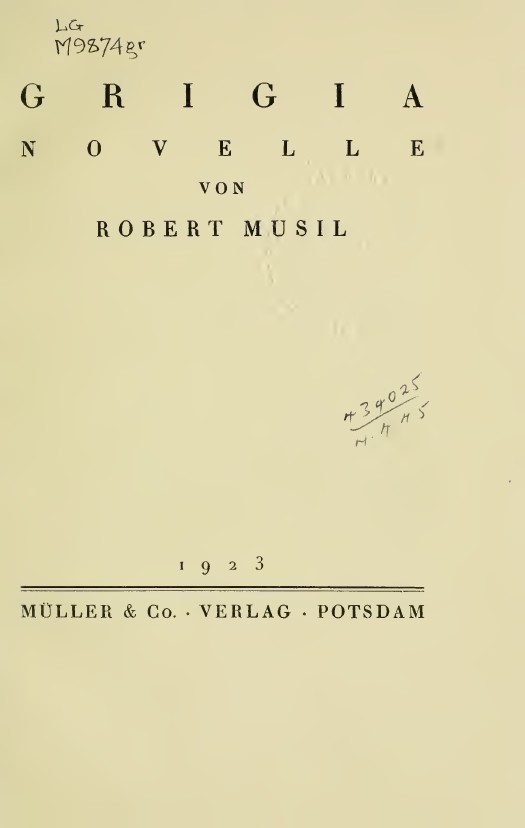Heinrich von Kleist is one of the most extraordinary German writers of an age when German writing was already shaping world literature. However, it took a long time for the world to get used to him. Goethe famously snubbed him, and Kleist’s biography tends to be haunted by its ending – he died in a suicide pact at age 34. Before that death, however, he managed to produce a small body of work – his complete works, including letters, fits snuggle into a single two-thousand-page volume – which time has only elevated in stature.
For Kleist did not fit in within his world. Stefan Zweig, the early-twentieth-century Austrian writer, wrote a book entitled Hölderlin, Kleist, and Nietzsche: The Struggle with the Daemon, which suggests something of his character and his kindred spirits. Kleist’s writing, which I have long struggled to get into, has at last opened itself up to me. I have conquered his dreadfully long and torturous German sentences for the first time, and now I am able to see for myself what the fuss is all about.

Kleist wrote dramas, and he wrote short stories, and he wrote a couple of interesting philosophical essays and journalistic pieces too. This post will focus on the short stories. At Cambridge I read Penthesilea, his tragedy involving Achilles and the eponymous Amazonian queen, but I could not understand it. Last month I read The Broken Jug and The Schroffenstein Family, both of which are early dramas which had moments of cleverness but were nevertheless a little contrived. I will read his more mature dramas, including Penthesilea again, in due course. But it is his short stories – eight of them, all written near the end of his life, that have motivated me to write today. For they are really something special.
In addition to his suicide pact, everyone likes to mention that poor Kleist had a rather significant mental breakdown in 1801. This is what scholars like to term the “Kant Crisis”. Kleist had been reading the aforementioned German philosopher and had accidentally broken down the foundations of his own world. It happens. Kleist learned from Kant that we are unable to penetrate through our sensory perception of the world to things as they really are. As he explained it to a friend, it’s as though everyone is wearing tinted glasses – our world is distorted, but we cannot know how, and we cannot know what the real world is actually like. Objective truth becomes impossible; at least Kleist saw it that way. Connections to others are fleeting, trust is impossible. Our world is only misunderstanding heaped upon misunderstanding. All this broke Kleist the man but it made Kleist the writer.
Style
Deceitful Reportage in Michael Kohlhaas
So what is this writer? Awful, is one way of describing him. His stories are made up of long, winding sentences, that occasionally bring German grammar up to its limits. These long sentences fit into paragraphs that go on for pages at a time. This does not make for easy reading. The two previous times I read Kleist’s prose, at school and then at my first year at university, I was crushed by it. The language was too complex, the syntax and lexis arcane. I had a feeling that I’d like Kleist, but I couldn’t reach him. Perhaps if he’d been born fifty years later, I thought, he’d have learned how to use speech marks and add a new paragraph here and there, as so often do his translators.
And yet these sentences and these paragraphs serve a purpose. “Michael Kohlhaas”, the longest novella, has the subtitle “from an old chronicle”. It tries, consciously, to be a kind of reportage. Kohlhaas, a real figure from the age of Luther, is blown up by Kleist into a titanic figure. A horse dealer who is wronged by an aristocrat, Kohlhaas burns the man’s castle to the ground and goes around pillaging half of Germany, just to get a kind of justice. Kleist pretends that the work is history, referring to “the chronicles whose comparison allows us to write this tale”. But the tale has little to do with the historical Kohlhaas, and Kleist’s approach seems designed more to derail our idea of history as something clear-cut and definite. The narrator informs us at one point that the sources disagree, and decides that he cannot really say what happened. At another point he mentions an emotion in Kohlhaas’s heart but refuses to say what it is. We are left with an allegedly objective document that falls apart.
Then there is the narrator himself. A man who refers to “the poor Kohlhaas” and only a moment later heaps insults upon him, the narrator provides no ballast. Though occasionally he appears to see into Kohlhaas’s heart, just as often he makes us see only a gesture, or a facial expression. As with some of my favourite books – Tolstoy’s Hadji Murat and Conrad’s Nostromo – Kleist presents us with a mysterious central character who we look upon, but rarely into.
The story further displays a defiance of objective truth by being filled with rumours – where is Kohlhaas and his band of rebels? – and mistakes. The justice system, supposedly on Kohlhaas’s side, and supposedly designed to help us reach Truth, proves hopelessly corrupt due to the influence of the aristocrats (mockery is made of the justice system in The Broken Jug as well). We repeatedly get the impression that around Kohlhaas are forces that he cannot understand and cannot predict, whether they are the scheming aristocrats or bandits using his name to further their own ends. In this, Kohlhaas becomes a kind of microcosm of humankind’s place in a not-fully-knowable universe, and a surprisingly modern work.
God and Perspective in “Saint Cecilia or the Power of Music”, “The Foundling”, and “The Earthquake in Chile”
“Michael Kohlhaas” uses a documentary style that ultimately undermines itself. Elsewhere, Kleist explores the importance of perspective in questions of truth. “Saint Cecilia or the Power of Music”, is a shorter story that is quite enigmatic. Four brothers arrive in Aachen with the intention of destroying some religious images – the time is at the height of Protestant fervour. They gather together a band of men and head to their target church, but during the mass, instead of giving the signal to attack, the brothers are overcome by the power of music. They begin to pray, and pray, and pray. They are brought to a madhouse, and there they stay, living out a long and somewhat strange life. The music that they heard was played by a nun that was apparently sick, but had miraculously recovered in time to perform. However, it later transpires that she was sick after all, and that her replacement’s identity is unknown.
What exactly has happened? We encounter much of the story through the eyes of the brothers’ mother, who travels six years later to Aachen in search of them. From one of the band of rabble-rousers she learns one version of the story, from the abbess another – and from other inhabitants of the town, still more versions. Nothing is clear, from who played the music to what happened to the brothers. We encounter a truth that has been shattered beyond repair, something Kleist makes clear by using numbers. We cannot reach the truth of a story where there were both definitely three hundred and one hundred rebels at the ready – we can only select a version that makes most sense to us.
And what does it mean that the brothers were converted? Is it an act of God? Perhaps, but we cannot be sure. They are catatonic, capable only of repetitious prayer. Although they appear to be happy, this is not the sign of a benevolent God – certainly not the kind of God that most of us look for. The boys’ mother is converted to Catholicism at the story’s end, but it’s a conversion that seems slightly absurd to us – we cannot understand her. We know what she experienced, of course, because we read about it – but we do not know how she interpreted it or how it touched her core.
God lies at the heart of Kleist’s most exciting works. Does he exist, and what is he like if he does exist? Kleist’s style reflects a refusal, a brutal refusal, to answer these questions. In “Saint Cecilia” we see an apparent act of God, but one that only makes God seem stranger than what we’ve been led to expect – it disorientates us. In “The Foundling”, another extraordinary story, a merchant takes in an orphan after his son dies and raises him as his own. And in return for all this unconditional, Christian kindness, he is treated with an almost satanic cruelty. It does not make sense. It challenges that Christian-moral firmament upon which our worldview rested in Kleist’s day, and still mostly rests in our own day. The tragic conclusion of “The Earthquake in Chile” takes place in and outside a church, but it is brutally violent and fit only for an old-testament God in one of His worst moods.
Conclusion
Any good story has an element of ambiguity, but Kleist’s ambiguity seeps through to his very formal approach to problems. We see events and characters from multiple angles, in a style that appears to be factual, but all this does not take us any closer to resolving our issues. On the contrary, it makes them even more acute. We have a God who seems to exist, but rather than providing a bedrock upon which to build a certain surety, Kleist uses his God to make us even more confused about what we think of as truth.
I admit that the style is frustratingly dense at times, and the sentences need attacking with a hacksaw, but if one can get over these hurdles, they will find in Kleist a writer who is very much worth reading. He is a figure who is disquieting in the extreme and strikingly contemporary. More posts on him to follow.






